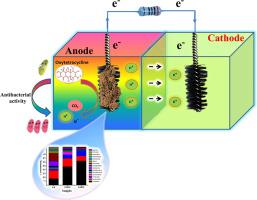Bioelectrochemistry ( IF 5 ) Pub Date : 2020-07-29 , DOI: 10.1016/j.bioelechem.2020.107623 Jing Zhang 1 , Liangliang Chu 2 , Zongwu Wang 3 , Wei Guo 4 , Xiao Zhang 5 , Xiao Zhang 5 , Ruyan Chen 5 , Shuying Dong 5 , Jianhui Sun 5

|
Dynamic changes in power generation and electrochemical properties were compared between the control microbial fuel cells (C-MFC) and an oxytetracycline (OTC)-treated MFC (O-MFC) on days 84, 139, 174, 224, 295, 307 and 353. The results showed that a high concentration of OTC (>5 mg·L−1) could inhibit microbial activity and result in a decline of voltage output and power density compared with the same C-MFC. However, with the prolongation of incubation time, the inhibitory effect was gradually weakened. Electrochemical analyses demonstrated that long-term OTC acclimation reduced the ohmic and polarisation resistance of the anode, which was conducive to the recovery of electrochemical performance. More than 99% of 10 mg·L−1 OTC could be removed within 48 h, and the antibacterial activity of the MFC effluent on Escherichia coli DH5α was conclusively eliminated. High-throughput sequencing analysis revealed that the diversity and richness of the microbial community decreased significantly after long-term OTC enrichment. Acinetobacter, Petrimonas, Spirochaetaceae and Delftia were enriched and played a dominant role in C-MFC stability and power generation. The promotion by Cupriavidus, Geobacter and Stenotrophomonas in simultaneous OTC degradation and bioelectricity generation in the O-MFC was demonstrated.
中文翻译:

长期暴露于日益增加的土霉素剂量下,微生物燃料电池中电化学和生物学特征的动态演变。
比较了第84、139、174、224、295、307和353天对照微生物燃料电池(C-MFC)和土霉素(OTC)处理的MFC(O-MFC)的发电和电化学性能的动态变化。结果表明,与同一种C-MFC相比,高浓度的OTC(> 5 mg·L -1)可以抑制微生物的活动,并导致电压输出和功率密度的下降。但是,随着孵育时间的延长,抑制作用逐渐减弱。电化学分析表明,长期的OTC驯化降低了阳极的欧姆电阻和极化电阻,这有助于恢复电化学性能。10 mg·L -1以上的99%可以在48小时内除去OTC,并最终消除了MFC废水对大肠杆菌DH5α的抗菌活性。高通量测序分析表明,长期OTC富集后,微生物群落的多样性和丰富度显着下降。不动杆菌,Petrimonas,螺旋藻科和Delftia富集并在C-MFC稳定性和发电中起主导作用。铜杯菌,地细菌和嗜单胞菌促进了O-MFC中同时OTC降解和生物电产生。



























 京公网安备 11010802027423号
京公网安备 11010802027423号